The 21st century is the age of digitization. Everything has an internet connection, 24/7 from complex data servers at Google to your android smartphone. With the rise in connectivity across the globe, digital currency has become the new cash and carry. Today, when you want to buy something, the options to pay for it are plenty. From credit & debit cards, net banking, UPI, and even QR codes.
With the rise in digital payments, there is also a rise in digital crimes with hacked bank accounts, payment scams, digital fraud, etc. Increasing our digital security is the need of the hour. How can we be smart online? How can we protect our digital transactions? How can we stop digital crime in its tracks? Read on to find out.
Risks On Online transactions
●Phishing
Phishing is a type of online crime where hackers employ social engineering and technical subterfuge to steal consumers’ identity data and financial account credentials. Social engineering schemes make use of spoofed emails, making them look like they’re from legitimate businesses and agencies. These emails lead consumers to counterfeit websites that trick recipients into divulging financial data, such as usernames and passwords.
●Ransomware
Ransomware is one of the most widespread and damaging threats that internet users face. Hackers use unbreakable encryption, meaning that extortion has evolved from simple social engineering, with little to no consequences for failure to comply, to permanent data loss unless they receive an excessive fee.
●Distributed Denial of Service (DDoS)
A DDoS attack uses many computers (often bots) distributed across the Internet to consume available resources on the target. DDoS assaults intend to render a server or network resource unavailable to its intended users. Attackers use network attacks, protocol attacks, or application-layer attacks.
Staying Smart Online
Even with the increasing number of risks regarding online transactions, it is still possible to keep yourself safe while you’re online with the following tips:
●Check If A Website Is Legitimate
Always check if the bank websites, payment gateways, and digital payment platforms you use for online transactions have a secure HTTPS tag. Besides the URL of the website, there is a ‘Secure’ label or a lock icon on Google Chrome and other browsers. A browser should automatically block an insecure website.
●Opt For OTPs To Passwords
Today, most online transactions require a one-time password (OTP) that a bank or an equivalent institution receives as user permission to authorize a transaction. In the OTP method, users receive an SMS on the mobile number registered with the bank to complete online transactions.
Users mustn’t share their OTPs with anyone and read reminders from banks to not share your card details or OTPs with anyone who claims to belong to your bank.
Despite having the OTP method, users need to create a password for transactions. A strong password must include English letters in upper case, lower case, digits, and special characters and contain at least eight characters. Avoid using passwords like your name or family name. Do not use the same password for two different cards or bank accounts. Finally, keep changing your password at least once in three months and avoid saving passwords on your browsers to prevent data theft.
Avoid Using Public Wi-Fi and Computers
Public Wi-Fi or internet connections are not secure, so it is not advisable to use online banking or shopping.
●Lock Your Devices/Mobile Wallets
Lock your devices using intricate patterns, security codes, or passwords for your devices, phone wallets, and bank accounts.
●Link Only With Relevant Apps
Connect your bank accounts only with apps you trust.
If you notice any suspicious activity on your online account or make a payment by accident, contact your bank immediately.
●Use VPN
Using a Virtual Private Network (VPN) not just avoids geographical restrictions on your internet, but it also provides an additional layer of security to your internet banking and digital payments. It is a tool to secure web browsing sessions by enterprises and individual users. You can add a VPN on your smartphone or your Wi-Fi network at home. For a smartphone, you will have to download and install a VPN app. Most VPN apps charge a monthly subscription, while some like Opera VPN are entirely free to use. Deploying a VPN in a wireless router will transmit all online communication through an encrypted tunnel created by the VPN.





